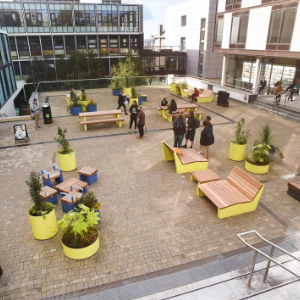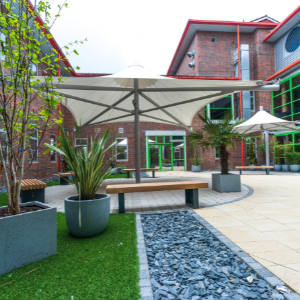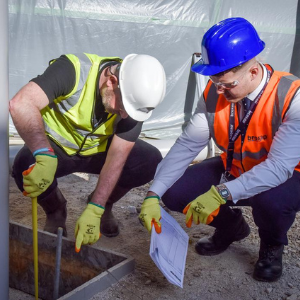Homes and businesses will be able to recycle more easily under a review of waste collections spearheaded by the Government.
The reforms are said to offer a simpler, common sense approach to recycling aimed at boosting recycling rates to protect the environment.
People across England will be able to recycle a wide range of products and materials whether at home, work or school in a nationwide approach aimed at reducing the number of different bins needed and providing a more convenient collection system.
What are the reforms to household and business bin collections?
Under the new requirements, all local authorities in England must collect the same materials for recycling or composting from households.
The recyclable waste streams include paper and card; plastic; glass; metal; food waste and garden waste.
All non-household municipal premises, such as businesses, schools and hospitals, must make arrangements to have the same set of recyclable waste streams, bar garden waste, collected for recycling or composting and must separate their waste accordingly.
The frequency of rubbish and recycling collections will also be reviewed. The Government proposes that councils collect non-recyclable waste at least fortnightly if not more regularly to protect neighbourhoods. This will be a minimum requirement.
New weekly food waste collections will also be introduced.
In all, there will be separate collections of three types of waste: residual (non-recyclable); organic recyclable waste and dry recyclable waste.
When will the changes to recycling and general waste collections come into force?
Simpler recycling for non-household premises will be implemented by 31st March, 2025.
The system for households comes into effect a year later, in 2026 although there may be a transitional period as local authorities switch to new contracts or new service providers.
Micro-firms, which are businesses with less than 10 full-time equivalent employees, will need to meet the requirements by 31st March, 2027 which is when plastic film and flexibles will be added to the recyclable waste streams being collected from all premises.
Why have the waste and recycling reforms been drawn up?
The aim of the new system is to reduce confusion over what can and can't be recycled.
Research published by the University of Manchester this year (2023) shows the items collected for recycling varies massively according to which local authority area you live in.
In said in the UK there are 39 different bin collection regimes across 391 local authorities, with fluctuations within the rules not only on what will be collected but also on how it should be presented.
Climate action charity Wrap found that 82% of UK households regularly add at least one item to their recycling collection that's not accepted locally, while 16% of the waste delivered to recycling facilities is contaminated.
In the future, when the changes come into force, people will be able to recycle the same materials in the same way without needing to check what their council will accept for recycling.
How will recyclable and non-recyclable waste be collected under the new system?
Proposals include allowing waste collectors to collect dry recyclables together in the same bin or bag, and collect organic (food) waste together.
This simpler recycling initiative will ensure households don't need an excessive amount of bins, in some cases reducing the number of waste and recycling bins, bags or boxes to just three. No councils will be required to provide seven different bins.
The result is expected to be a more convenient and practical system, helping everyone to recycle more in a way that does not result in waste hanging around for collection or needing an excessive number of waste containers.
Instead everyone will benefit from a more frequent and comprehensive recycling and waste collection service.
Recycling and food waste bin solutions from Broxap
As a leading UK designer and manufacturer of litter and recycling bins, our teams have been developing a series of products to support the simpler recycling reforms.
Among these is a new food waste wheelie bin cover, ideal for co-housing premises such as flats, halls of residence or supported living accommodation.
Designed for the hygienic and safe collection of food waste, these large capacity bin covers are clearly labelled with the option of graphics as well as text to identify the type of waste being collected.
The bin comes with an enclosed lid and easy open aperture to contain the waste and protect against unwanted vermin.
Our range also extends to internal recycling bins, outdoor recycling bins, multi waste stream recycling bins and wheelie bin housings.
Broxap's commitment to a more sustainable future
Household recycling rates in England increased from 11% in 200/2001 to 42% in 2021/2022 but have now plateaued.
It is hoped that under the reforms the municipal recycling rate will reach 65% by 2035.
This will in turn reduce landfill and incineration and the associated carbon emissions; reduce carbon emissions linked with the production of goods from virgin materials; and support the growth of the UK recycling industry.
Encouraging recycling through the provision of reliable, durable and convenient recycling bins is a significant part of our business.
And as well as supporting initiatives such as recycling-on-the-go and simpler recycling for homes and business, we support a circular economy through our bin manufacturing processes.
The steel sheet metal used to make our bins is hot dip coated to the BS EN 10346:2015 standard for a longer life span, while our advanced polyester powder coating system delivers superior levels of corrosion resistance.
These are just some of the ways we help to ensure materials are kept in use for longer, reducing waste and providing our customers with high-quality, dependable products.
As our design and manufacturing teams all work from the same site, we are experienced in collaborating with clients to produce waste management facilities which are compliant and which meet their individual needs.
To discover more about our new food waste wheelie bin cover, or the sustainable manufacturing methods we use to produce our litter and recycling bins, contact our team today.


















